Advertiser Disclosure: Eye of the Flyer, a division of Chatterbox Entertainment, Inc., is part of an affiliate sales network and and may earn compensation when a customer clicks on a link, when an application is approved, or when an account is opened. This relationship may impact how and where links appear on this site. This site does not include all financial companies or all available financial offers. Opinions, reviews, analyses & recommendations are the author’s alone, and have not been reviewed, endorsed, or approved by any of these entities. Some links on this page are affiliate or referral links. We may receive a commission or referral bonus for purchases or successful applications made during shopping sessions or signups initiated from clicking those links.
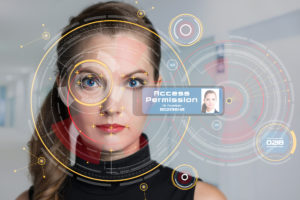
Delta is rolling out facial recognition boarding to more airports. It sure sounds slick and futuristic. But are you comfortable with it?
Delta’s Growing Biometrics Uses
Delta has been involved with biometrics for several years. They incorporated CLEAR into a couple of aspects of the company (we’ll talk about that in a minute). They opened the country’s first biometric terminal.
If you’re like me and always have a hard time getting a Delta check-in kiosk to read your credit card, facial recognition check-in sounds like a godsend! 😉
Now, your face serves as your boarding pass.
Where Delta Uses Facial Recognition Boarding
Facial recognition is used at select gates in:
- Atlanta (ATL)
- Detroit (DTW)
- Minneapolis (MSP)
- Salt Lake City (SLC)
The feature is currently limited to international flights. A Presidential executive order will bring it more the country’s top 20 airports by 2021. (JetBlue also uses facial recognition at Boston. It could get ugly in Beantown with a facial recognition throwdown between JetBlue and Delta! 🙂 )
How Delta Uses Facial Recognition Boarding
As passengers approach the gate agent’s kiosk, they look into a screen. Their facial features are captured and then compared to the US Customs and Border Patrol’s massive database of passport and visa application photos.
Once a passenger’s identity is confirmed, she or he is permitted to board.
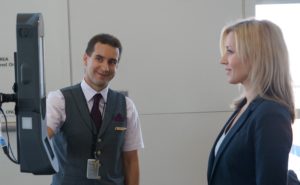
A video from the Atlanta Journal-Constitution gives us a virtual demonstration:
Around the 4:00-minute mark, there seem to be hangups at both of the gate’s facial recognition devices. But for the most part, the process flows smoothly.
Wait. How Does Delta Access to Our Biometrics?
Oh, don’t worry. The government gives it to them. That’s right. The government and Delta simply teamed up to share our biometrics without our explicit consent.
You know, the same federal government whose voter database, Veterans Administration, archives, and personnel management were hacked.
What could possibly go wrong?
What if the database or the machines Delta uses get hacked? Can photos of innocent people somehow be linked to the names of criminals?
Also, you’re not able to opt-in to use the service. Delta implements facial recognition for given flights. And that’s that.
“People in the United States can’t be searched unless they’re suspected of crimes,” the Washington Post‘s Geoffrey A. Fowler writes. “And anonymity is a pillar of free speech”
Mr. Fowler notes, “Customs says it deletes the photos it receives of citizens after 12 hours. JetBlue and Delta say they don’t keep the photos they take of us.”
Don’t Worry: It’s (Supposed to be) Optional
Facial recognition boarding is voluntary and optional — though some reports indicate this isn’t made clear to everyone.
ZDNet’s Chris Matyszczyk heard a Delta gate agent hype up how awesome facial recognition boarding is. But he says the agent left out something rather important. “The one part he seemed to omit was that it was optional.”
He also notes Allie Funk — a writer for Wired — had a similar experience in Detroit.
This isn’t exactly confidence-inspiring.
Delta: CLEAR-ly a Fan of Biometrics
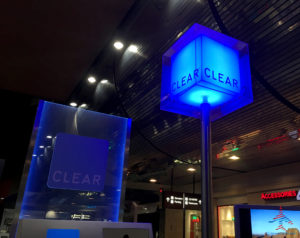
The facial recognition boarding shouldn’t be confused with CLEAR — a biometric identification company Delta bought a small share of a few years ago. Both René and I are big fans of CLEAR.
CLEAR is sort of a PreCheck for PreCheck, if you will.
Enrolled members provide electronic fingerprint and iris scans to CLEAR upon enrolling at one of the company’s locations.
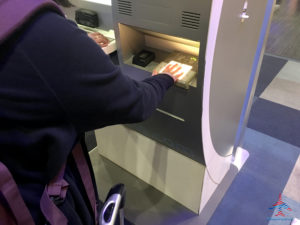
Members pay a yearly fee for the service. (FWIW, Delta and CLEAR offer discounts to Delta co-branded Amex cardholders and SkyMiles members. It’s free for Diamond Medallion®s.)
Before selecting a TSA line (PreCheck or standard) CLEAR members verify their identity at kiosks. Once they’re “Clear!” (yes, the CLEAR reps do say that), members are escorted to the front of either PreCheck or the standard line, whichever one for which they’re qualified. CLEAR doesn’t always save me time over the PreCheck line. But it’s come in very handy many times — and once saved me a half hour PreCheck line at BWI.
Delta allows people to check-in at Sky Clubs using CLEAR, too.
Easy to Be Hypocritical
It’s easy to be critical of facial recognition boarding because it’s new. (And, you know, the government and Delta are in biometrics cahoots.)
Yet how many of us willingly…
- gave fingerprints and retinal scans to CLEAR?
- gave fingerprints and a picture to Global Entry?
- had a passport photo taken at a shipping store with no idea what they do afterward with the digital files?
- scan our passports at Delta kiosks before international trips?
- use Facebook and Google — two companies who don’t exactly have a sterling reputation when it comes to protecting users’ information?
But We Already Use Biometrics to Unlock Our Smart Devices!
I love the fingerprint passkey function on my iPhone. My wife has a Pixel and loves the biometric feature on her phone. Some phones now have facial recognition to unlock screens and more. That’s the same as facial recognition stuff at the airport, right?
Nope.
“When you unlock an iPhone, your face scans never go to Apple or even leave your phone,” WaPo‘s Fowler says.
Facing Facts
As a geek and traveler, facial recognition boarding sounds pretty cool. I’m not a criminal and don’t have anything to hide. So assuming everything works as it should, I have nothing to fear. After all, I love using CLEAR and that, too, stores my biometrics.
I want to believe that we’ll be OK. And that our data won’t ever fall into the wrong hands.
But some doubt still lingers inside me.
Am I being overly paranoid?
What Do You Think?
If you’ve had the opportunity to let your face serve as your boarding pass, please tell us below about your experience.
If you haven’t, would you opt-out or use the feature?
Overall, how do you feel about facial recognition boarding and other features? — Chris
Advertiser Disclosure: Eye of the Flyer, a division of Chatterbox Entertainment, Inc., is part of an affiliate sales network and and may earn compensation when a customer clicks on a link, when an application is approved, or when an account is opened. This relationship may impact how and where links appear on this site. This site does not include all financial companies or all available financial offers. Opinions, reviews, analyses & recommendations are the author’s alone, and have not been reviewed, endorsed, or approved by any of these entities. Some links on this page are affiliate or referral links. We may receive a commission or referral bonus for purchases or successful applications made during shopping sessions or signups initiated from clicking those links.


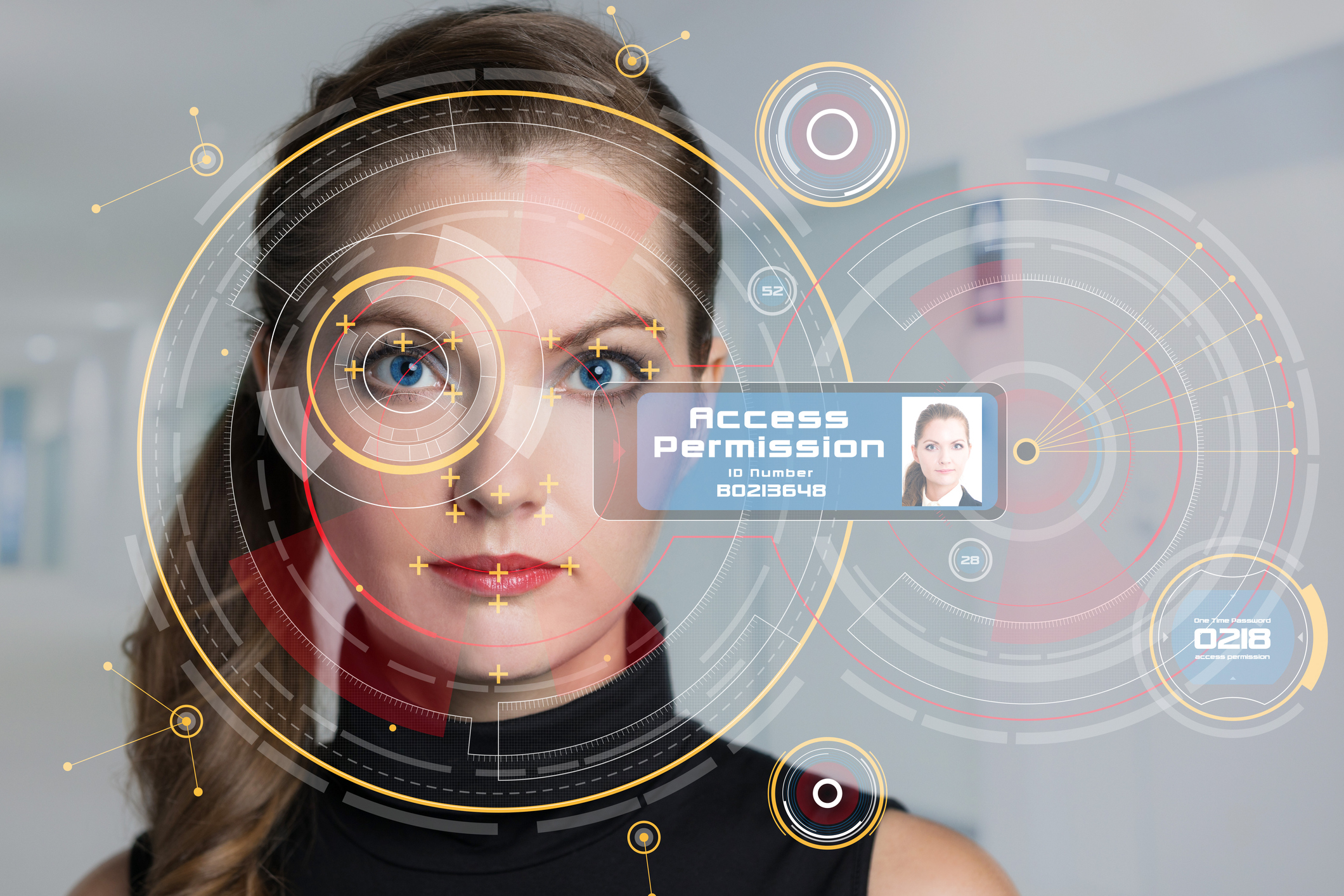
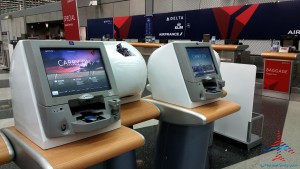
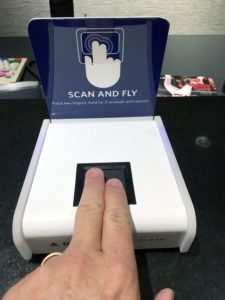
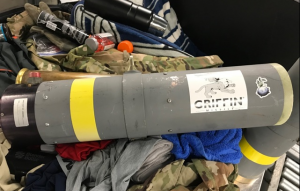







Don’t have a problem with it. I do have a problem with states selling your personal info without your consent (other than the implied consent you gave when obtaining a drivers license).
You may have ‘nothing to hide’, but you have plenty to be hacked and stolen, not just by criminals, but also by intelligence services of non-friendly nations. (See OPM data breach, Equifax data breach, 2016-2020 election manipulation, etc.)
I don’t think this is going to end well.
Of course, if you’re mainlining everything about yourself, your family, and your friends directly to Facebook, you’re/they’re probably screwed anyway. (Generic ‘you’, I mean.)
Global Entry, Clear, licenses, biometric building/security access…I have knowingly and willingly provided my biometric data numerous times. As an adult making an informed decision I’ve chosen to do so.
That is very different than the gubmint deciding for me/us. Our rights to privacy and protecting us from unlawful search and seizure would seem to challenge the government from providing/releasing/sharing such data without our consent.
Not being a big “fine print” guy, did I surrender the right to make those choices when I signed whatever I signed for a passport, TSA something or other, security clearance?
While I love…love the convenience these platforms offer us I am less than ok with the info shares.
Just my $0.02
I don’t have a problem with it. Some of the people complaining about privacy don’t have an issue with posting all their life details on Facebook with minimal privacy settings. If people are worried about privacy, they only have to remind themselves that everything we do is seen by our Employer (and I don’t mean the company we work for).
1. I don’t use CLEAR?
2. I don’t have Global Entry?
3. I had passport photo taken anonymously, I find it very hard to match my face unless they already have that info.
4. I don’t scan passports at kiosks.
5. I don’t use any social networks Facebook and Google.
6. I use pin to unlock my phone never my face or fingerprints.
Bonus:
I use duckduckgo and incognito mode all the time.
I never use any voice recognition, Alexa Siri Google ever.
It’s the [removed] like this or Equifax that loses my identity because I’m FORCED to give it.
But why? This smacks of paranoia.